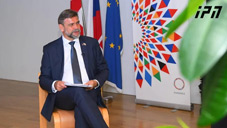
Boycotting Not Leading to Depolarization, Czech Ambassador Says on Opposition
By Khatia Bzhalava
Thursday, July 14, 2022
Petr Mikyska, the Ambassador of Czechia to Georgia, told local media outlet Interpressnews in an interview that the decision of the Georgian opposition to boycott the working groups proposed by the ruling Georgian Dream party to fulfill the European Union membership status conditions is a mistake.
According to the ambassador, all political forces and civil society in Georgia should discuss the setup for the next steps to improve the domestic political field, and only then proceed with the moves.
“I consider it [boycotting] an error. As I said, there must be a constructive approach of all political parties, of all political forces…First, in my opinion, all political forces and civil society should meet, should discuss how will be the setup for the next steps and only then proceed. Preconditions, boycotting, and so on is a clear error which is not leading to depolarization”, he told Interpressnews.
The Ambassador also added that depolarization was possible in case there was “relevant will” from political forces in the country, and added that every step in the European integration direction should be made in a consensus and be discussed between all political parties and with the civil society.
“All forces, the government, and the opposition and civil society should realize that they have to meet constructively, that they have to discuss in a civilized manner, without insults, without claims, without preconditions, and only in this way the depolarization can be reached. It's not just for the sake of the candidate status, it's for the sake of normal civilized development of this country," said the Ambassador.
The Parliamentary working group created to review judicial reforms for fulfilling conditions outlined by the European Union for granting Georgia the membership candidate status held its first meeting on Monday. Some opposition parties rebuffed to join the meeting citing a ‘lack of confidence’ in the ruling party and demanding “concrete compromise steps” to be included in the process.


